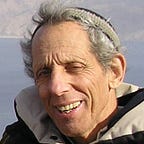My Enlarged Prostate Is a Big Blessing
How racing to the bathroom can make you appreciate God.
Thank God for making me run to the toilet every two hours in the middle of the night and giving me the opportunity to praise Him for creating those two tiny openings that keep me alive.
I am 77, around the age at which 80 percent of all men have an enlarged prostrate, an organ that is located just below the bladder. This applies to men only because women do not have a prostate, one of G-d’s creative acts of discrimination.
A normal prostate gland for younger men is approximately the shape and size of a walnut. It surrounds something called the urethra, a tube that carries urine to that thing that is circumcised or uncircumcised, depending on your religion.
By the age of 50 for approximately half of all men, a healthy-sized lemon replaces the walnut as the descriptive term for the prostate, which being bigger, starts to squeeze the urethra and cause the need to urinate more often.
I don’t know much about how the human body works beyond the ability to do whatever has to be done to have children, but I do know this much: I have a choice of wetting my pajamas every two hours in the middle of the night or getting out of bed and running to the toilet.
I prefer the toilet option.
Jewish sages declared that God deserves a blessing after one finishes in the bathroom, not for reading the newspaper or scrolling through WhatsApp messages but for relieving himself.
Children love to giggle when they first learn the Jewish blessing that praises God for giving us the ability to do what we take for granted. It goes like this:
“Blessed are You, our Lord… who formed man in wisdom and created
within him many openings and many hollow spaces … that if even one of them would be opened, or if even one of them would be sealed, it would be impossible to live…. Blessed are You, our Lord, Who heals all flesh and acts wondrously.”
My bi-hourly trips to the bathroom, instead of leaving me giggling, give me the privilege to reach the daily goal of blessings that rabbis have determined.
Jews are supposed to recite at least 100 blessings a day, one of those rabbinical obligations that Torah sages determined by being proficient in arithmetic. It is no wonder that Einstein was Jewish.
The concept of reciting 100 blessings a day is based on a system called “gematria,” which gives any given word a hidden meaning based on its numerical value. In English, if “A” equals 1 and “Z” equals 26, then the numerical of “add” is nine (A+D+D=9).
The most common example in Hebrew is the word “Chai,” which means “life.” It has the numerical value of 18 and therefore often is the amount of dollars, shekels or dinars that Jews give to charity as a symbol of life for both the giver and the recipient.
If you are ready to learn a bit of Talmud, I will help you understand how rabbinic sages reached the number of 100 blessings.
They noted that during the reign of King David, when 100 people died every day due to a terrible plague, the king and his wise men declared that everyone should say 100 blessings day. Afterwards, the plague stopped, obviously not by chance.
The rabbis also taught that the Hebrew word for “what” (mah)” can be read as “one hundred (“me’ah”). The word appears in Deuteronomy 10:12, where Moses tells the Jewish people, “What does G-d ask of you?”
The Talmudic sages put two and two together and concluded the obvious. “What” G-d asks for is that 100 blessings should be said each day.
That’s the end of today’s lesson on Talmud. Now, back to math.
The simple calculation is that reciting 100 blessings a day comes out to one every 15 minutes, and saying “God bless you” after a sneeze does not count.
A Jew who prays three times a day as ordained recites 90 blessings, easily getting him within reach of a touchdown. If he or she eats bread three times a day, we can add another six blessings, one before eating and one collective bunch of blessings — “Grace after Meals” — after eating.
The other four blessings to get to 100 are found in the bathroom, or more precisely, after leaving the bathroom and washing the hands. Most people go to the bathroom at least four times day, easily reaching the goal line for blessings.
I have no idea if G-d gives me Brownie points, but my enlarged prostate requires me to say additional “after the bathroom” blessings. That gets me deep into the end zone.
There is another meaningful and deep, if not Kabbalistic, understanding of the blessing — but, excuse me, not now. I have to run before it’s too late.
“Thank you, God, for my prostate,” may it continue to grow and be healthy.
